As the situation develops, both nations' decisions could lead to a wider conflict or a renewed diplomatic effort.
**Tensions Escalate: US Strikes Iran and the World Awaits Their Response**

**Tensions Escalate: US Strikes Iran and the World Awaits Their Response**
The US military strikes on Iran's nuclear sites mark a turning point in international relations, with potential repercussions for global stability.
The long-standing avoidance of direct military confrontation between the United States and Iran has been shattered as US forces launched airstrikes on key Iranian nuclear facilities, a move that many observers are calling unprecedented. For decades, US Presidents have refrained from military engagement, worrying about the potential for escalation into a broader, destabilizing war in the Middle East. However, the current President, known for his unconventional approaches, has dramatically redefined diplomatic boundaries by striking at the heart of Iran's nuclear program.
This unprecedented escalation comes at a time when the Islamic Republic finds itself grappling with paradoxical pressures. Iran's Supreme Leader Ayatollah Ali Khamenei, reportedly in hiding, faces a critical dilemma. Publicly, he must assert Iran's strength and retaliatory capacity, but any military response could lead to catastrophic consequences, including a devastating American counterattack. Analysts like Sanam Vakil from Chatham House suggest that Khamenei's next play could significantly determine the trajectory of his leadership and Iran's place in history.
In response to the US strikes, Iran's Revolutionary Guard has issued fierce warnings of retaliation, implying enduring military repercussions for the United States. While Iran does not seek a full-scale war, the actions and rhetoric of its leaders indicate a necessary response to maintain their image as a formidable regional power, despite the damage sustained. Indeed, the current Israeli military operations have already inflicted significant losses on Iran's military infrastructure and leadership.
However, any Iranian retaliation carries substantial risks. An overt attack on US bases would likely invite devastating American responses, while more covert attempts to undermine US interests could risk escalating the conflict further. The closure of the strategic Strait of Hormuz would not only create economic turmoil but also draw in additional global powers, complicating the situation dramatically.
Historically, the US-Iran dynamic has been fraught with tension, particularly following President Trump's actions—such as the assassination of Qasem Soleimani—which brought both sides to the brink. Yet fears are mounting that the current situation could spiral far beyond previous escapades, especially as the US military claims to have achieved critical damage to Iran's nuclear capabilities.
Iranian officials have characterized Washington's diplomatic overtures as deceptive and suggest that, without substantial changes, they will not return to negotiations while under threat. Diplomatic channels, particularly involving European nations, are now urging de-escalation rather than military engagement in addressing Iran's nuclear ambitions.
As both nations navigate this treacherous moment, analysts predict that the outcome may pivot not only the fate of Iranian nuclear policy but also reshape regional and global security dynamics for years to come. Amid mounting pressures domestically and abroad, President Trump's next steps will be closely scrutinized as he negotiates between his support for Israel and the imperative to avoid entanglement in another prolonged conflict. The implications of these decisions could prove disastrous, emphasizing the disaster of allowing militaristic reprisals to become the dominant mechanism for addressing international disputes.
This unprecedented escalation comes at a time when the Islamic Republic finds itself grappling with paradoxical pressures. Iran's Supreme Leader Ayatollah Ali Khamenei, reportedly in hiding, faces a critical dilemma. Publicly, he must assert Iran's strength and retaliatory capacity, but any military response could lead to catastrophic consequences, including a devastating American counterattack. Analysts like Sanam Vakil from Chatham House suggest that Khamenei's next play could significantly determine the trajectory of his leadership and Iran's place in history.
In response to the US strikes, Iran's Revolutionary Guard has issued fierce warnings of retaliation, implying enduring military repercussions for the United States. While Iran does not seek a full-scale war, the actions and rhetoric of its leaders indicate a necessary response to maintain their image as a formidable regional power, despite the damage sustained. Indeed, the current Israeli military operations have already inflicted significant losses on Iran's military infrastructure and leadership.
However, any Iranian retaliation carries substantial risks. An overt attack on US bases would likely invite devastating American responses, while more covert attempts to undermine US interests could risk escalating the conflict further. The closure of the strategic Strait of Hormuz would not only create economic turmoil but also draw in additional global powers, complicating the situation dramatically.
Historically, the US-Iran dynamic has been fraught with tension, particularly following President Trump's actions—such as the assassination of Qasem Soleimani—which brought both sides to the brink. Yet fears are mounting that the current situation could spiral far beyond previous escapades, especially as the US military claims to have achieved critical damage to Iran's nuclear capabilities.
Iranian officials have characterized Washington's diplomatic overtures as deceptive and suggest that, without substantial changes, they will not return to negotiations while under threat. Diplomatic channels, particularly involving European nations, are now urging de-escalation rather than military engagement in addressing Iran's nuclear ambitions.
As both nations navigate this treacherous moment, analysts predict that the outcome may pivot not only the fate of Iranian nuclear policy but also reshape regional and global security dynamics for years to come. Amid mounting pressures domestically and abroad, President Trump's next steps will be closely scrutinized as he negotiates between his support for Israel and the imperative to avoid entanglement in another prolonged conflict. The implications of these decisions could prove disastrous, emphasizing the disaster of allowing militaristic reprisals to become the dominant mechanism for addressing international disputes.






















